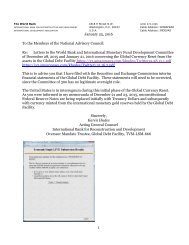KILLING-US-SOFTLY1
KILLING-US-SOFTLY1
KILLING-US-SOFTLY1
You also want an ePaper? Increase the reach of your titles
YUMPU automatically turns print PDFs into web optimized ePapers that Google loves.
This means that for all intents and purposes the 7 billion people who are alive today have a much<br />
greater impact on the planet’s ecosystems than an equivalent number of our forebears in the<br />
distant or immediate past. Consequently, the planet is straining under our load. Soil erosion,<br />
carbon dioxide accumulation, rapid deforestation, global warming and the melting of the polar<br />
caps and glaciers are but some of the consequences of the environmental burden we have<br />
become as a species. Given the impact we have on the planet at 7 billion strong, it takes no<br />
scientist to foresee that the planet cannot possibly sustain 14 billion of us let alone 28 billion,<br />
which is where we would be heading in less than a century had there been no proactive<br />
intervention and aggressive interference with our ability to have children.<br />
As our needs and numbers increase, we are placing unsustainable demands on critical resources<br />
like water and fossil fuels, which are vital to our survival and define our standard of living.<br />
Water shortages are already an impediment to development and even a threat to bare survival,<br />
causing conflict within and between nations. Both our fresh water supplies and our fossil fuel<br />
reserves are in crisis. 1.1 billion people live without clean drinking water and 2.6 billion lack<br />
adequate sanitation and these combined problems kill nearly 4000 children every day from water<br />
borne diseases.<br />
6











